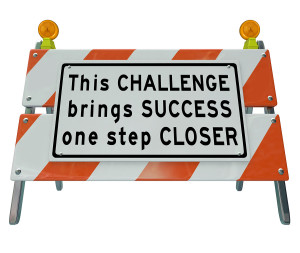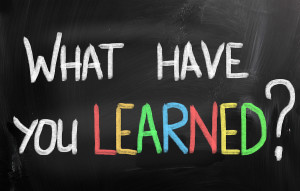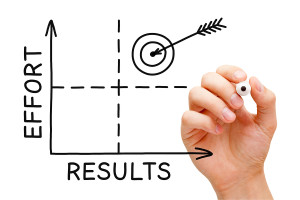 Last Thursday was like any other; I got up, went to work, and started my day. Mid-morning, my boss asked to see me. I walked into his office and when I turned the corner I noticed our HR Manager was there and my eyes got wide. I took a seat and was told that because of the way the business was going and job consolidation, he had eliminated my job. HR walked me through some paperwork, I packed my belongings, and was escorted out the door. I got in my car and drove home. I was in shock.
Last Thursday was like any other; I got up, went to work, and started my day. Mid-morning, my boss asked to see me. I walked into his office and when I turned the corner I noticed our HR Manager was there and my eyes got wide. I took a seat and was told that because of the way the business was going and job consolidation, he had eliminated my job. HR walked me through some paperwork, I packed my belongings, and was escorted out the door. I got in my car and drove home. I was in shock.
Five Lessons I Learned When My Job Was Eliminated
Starting from Scratch
 This past weekend I went golfing with my good friend Andy. Before hitting the course we hit the driving range. He wanted to work on my iron shots and chipping, which have been all over the place lately. So, we did what needed to be done, we started from scratch. He showed me how to swing my irons as if I’ve never golfed before. He had me start with the basics.
This past weekend I went golfing with my good friend Andy. Before hitting the course we hit the driving range. He wanted to work on my iron shots and chipping, which have been all over the place lately. So, we did what needed to be done, we started from scratch. He showed me how to swing my irons as if I’ve never golfed before. He had me start with the basics.
The Freedom to Experiment
 We’re told early on in life that we need to stay in the lines, don’t be sloppy, be neat. We can’t do things differently than others; that we need to blend in. But, if we aren’t given the chance to experiment, we’ll never know what we are capable of achieving. How do you learn to take leaps into the unknown when so much emphasis today is placed on being perfect?
We’re told early on in life that we need to stay in the lines, don’t be sloppy, be neat. We can’t do things differently than others; that we need to blend in. But, if we aren’t given the chance to experiment, we’ll never know what we are capable of achieving. How do you learn to take leaps into the unknown when so much emphasis today is placed on being perfect?
Staying Focused
 This past weekend I went on a golf outing with some friends. Golf is a challenging game. There are the physical components to it; you have to be lined up to the ball properly, take the proper swing, etc, but the main part of the game is mental.
This past weekend I went on a golf outing with some friends. Golf is a challenging game. There are the physical components to it; you have to be lined up to the ball properly, take the proper swing, etc, but the main part of the game is mental.
Golf forces you to concentrate on the moment; the shot at hand. When I think about hitting a good shot and focus on that I can often do it. But, when I think about the previous shot or the next shot, it affects my score – negatively.
What Can You Learn from Rejection?
 None of us likes being rejected. We often take it personally. If we get rejected, we often feel like we are a complete and utter failure, even when they are only criticizing one small aspect of us. If we took a step back, we could ask ourselves if there’s anything we can learn from the rejection.
None of us likes being rejected. We often take it personally. If we get rejected, we often feel like we are a complete and utter failure, even when they are only criticizing one small aspect of us. If we took a step back, we could ask ourselves if there’s anything we can learn from the rejection.
I place rejection in two categories, the first is someone who rejects us where it has nothing to do with us. There are those people who display their power every chance they get, and offering a negative critique is part of their arsenal. Unfortunately, we have to take this type of rejection for what it is; someone on a power trip and you’re the target. Ignore these people and their comments. It’s better to take feedback from people you trust anyway.
The other type of rejection is truly constructive criticism. It’s a rejection, but there’s something in the feedback that you can work with. This type of rejection can help us grow as a person and grow our skills. Often it takes time though for us to hear the true value of what was said. It’s normal to discredit their feedback with a comment like, “that person doesn’t know what they’re talking about.”
We don’t want to admit that the person who rejected us was right. But, it’s extremely important to examine what they’re saying about your skills or efforts. Take a look at it from their point of view. I remember when I had a screenplay of mine read by a professional. During our hour-long session my coach kept going over things that were weak in my script. It was hard to hear, but after a day or two I realized what she was telling me was helpful. It made me a better writer and it made the script stronger, so much so that it went on to take second place in a screenwriting competition.
If your work is rejected, look for the opportunity to get something out of it. Sometimes you get turned down for a job without any feedback. If there’s something in the back of your mind that you could have done better, make sure that next time you correct it.
Learn from the feedback people give you. It’ll help make you a stronger more well-equipped version of yourself.
What Playing the Bluebird Café Taught Me About Being the Best
 In 1998, I went to play the famous Bluebird Café in Nashville, TN. If you’ve never been there, the atmosphere is intimate. It’s dark and cozy, and it only holds about 90 people. Many stars were discovered there; Garth Brooks, Kenny Chesney, and Keith Urban to name a few. At the time, I thought about moving to Nashville and making it as a songwriter. The Bluebird Café was the place to go and judge where I stood against every other aspiring songwriter. It still is.
In 1998, I went to play the famous Bluebird Café in Nashville, TN. If you’ve never been there, the atmosphere is intimate. It’s dark and cozy, and it only holds about 90 people. Many stars were discovered there; Garth Brooks, Kenny Chesney, and Keith Urban to name a few. At the time, I thought about moving to Nashville and making it as a songwriter. The Bluebird Café was the place to go and judge where I stood against every other aspiring songwriter. It still is.Living on Autopilot
 Our lives are often on autopilot. We slip into a routine and that guides us. We do things in the same order everyday and we can seemingly coast through the day. If something disrupts the order that we’re used to, we’re thrown off kilter. I’ve gotten thrown off and forgotten to shave in the morning, or gotten out of the shower with shampoo still in my hair. Sometimes I wonder how I got home because I don’t even remember the commute!
Our lives are often on autopilot. We slip into a routine and that guides us. We do things in the same order everyday and we can seemingly coast through the day. If something disrupts the order that we’re used to, we’re thrown off kilter. I’ve gotten thrown off and forgotten to shave in the morning, or gotten out of the shower with shampoo still in my hair. Sometimes I wonder how I got home because I don’t even remember the commute!The World Doesn’t Owe You Anything
 I went through a phase in my life where I was frustrated by my lack of success. I thought, “When I’m discovered, then things will be different.” When I learned the truth that the world is never going to discover me. It made it easier to deal with. I was waiting for the world to hand me something just because I wanted it. Even if I hadn’t really earned it. (There’s also another lesson in there about how you define success, but I’ll save that for another time.)
I went through a phase in my life where I was frustrated by my lack of success. I thought, “When I’m discovered, then things will be different.” When I learned the truth that the world is never going to discover me. It made it easier to deal with. I was waiting for the world to hand me something just because I wanted it. Even if I hadn’t really earned it. (There’s also another lesson in there about how you define success, but I’ll save that for another time.)Hanging on to Regrets
Gaining Confidence and Success Through Visualization
 We are more confident when we are in comfortable situations. When we’re surrounded by people and places we know, it gives us a sense of security. We feel relaxed, loose. We perform better under these conditions.
We are more confident when we are in comfortable situations. When we’re surrounded by people and places we know, it gives us a sense of security. We feel relaxed, loose. We perform better under these conditions.
Follow Me!